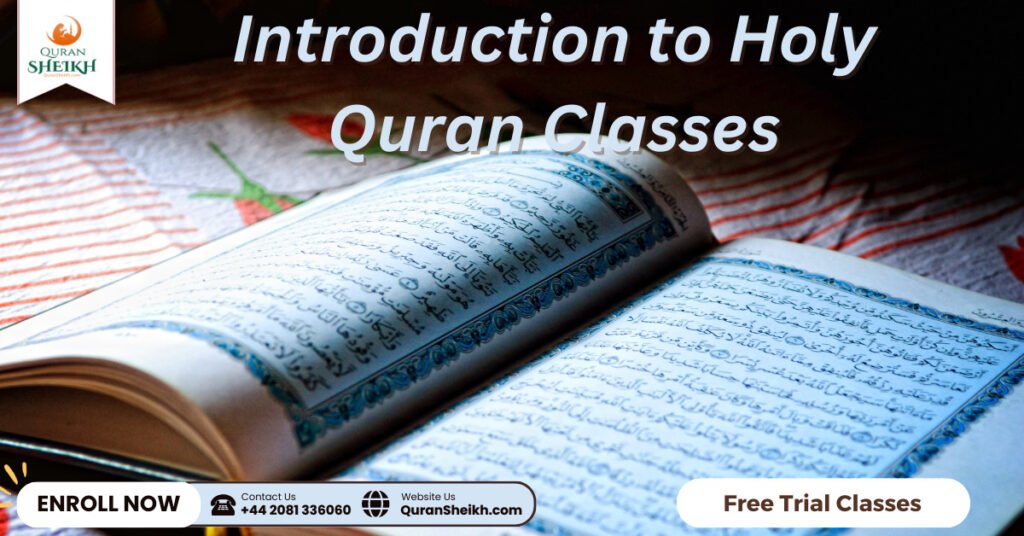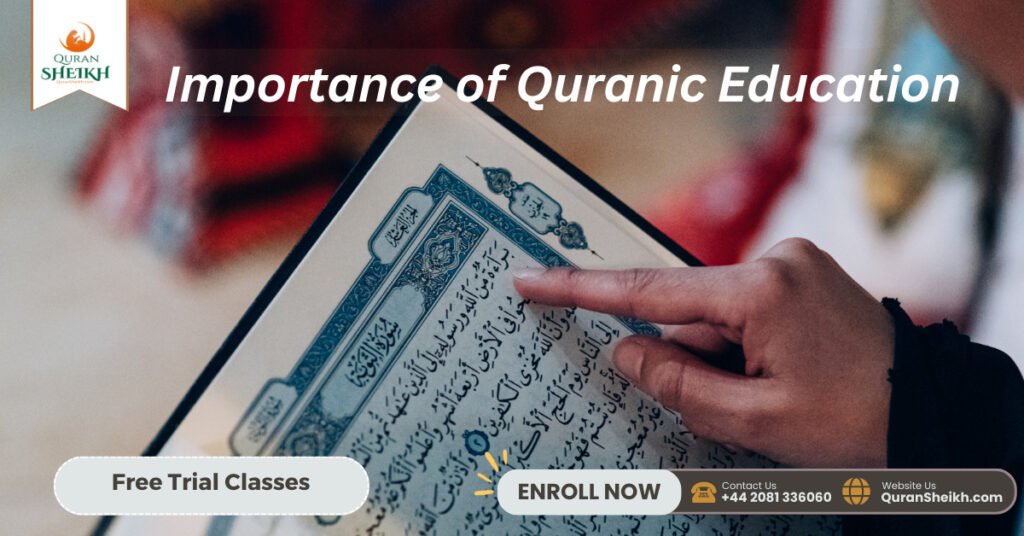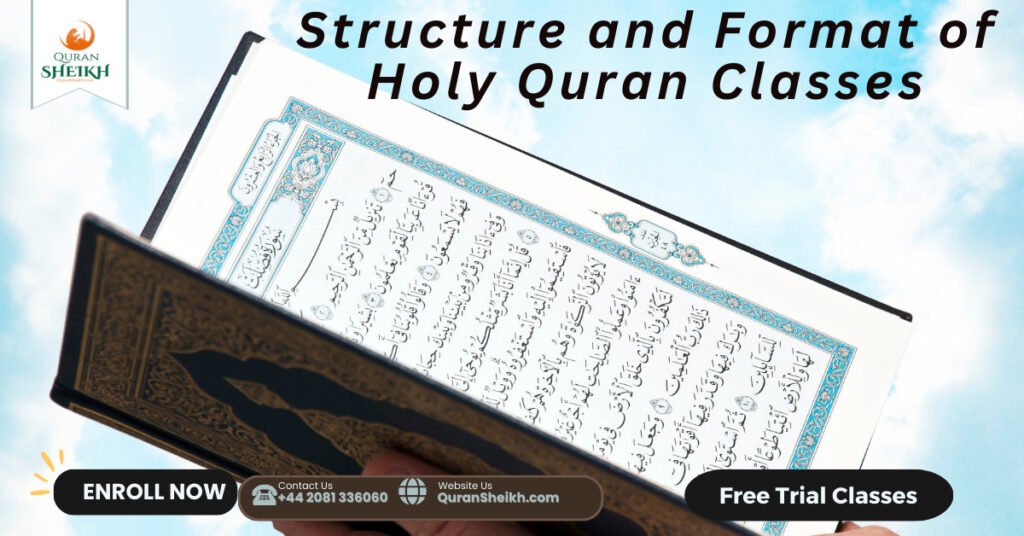1. Introduction to Holy Quran Classes
Within Islam, Quranic education bears great significance in connecting with Allah, fostering spiritual growth, and attaining comprehensive knowledge of Islamic principles.
Holy Quran classes play a pivotal role in imparting this education to individuals of all ages and backgrounds. This article discusses the significance of Quranic education. It also explores how Quran classes are structured and the qualifications required for Quranic teachers. Additionally, it examines interactive teaching methods and the advantages of Quranic education for individuals and communities.
Lastly, it addresses the challenges faced in implementing Quranic education and proposes potential solutions.
Our aim is to encourage the development of spiritual growth, promote community strength, and empower individuals to live their lives in alignment with the Qurans divine guidance through our support for Quranic education.
Join thousands of Muslim Families who love learning Quran, Arabic and Islamic Studies from the comfort of their Homes.
1. Introduction to Holy Quran Classes

Islamic education is incomplete without the study of the Quran. Quranic classes provide individuals with the opportunity to deepen their understanding and connection with the holy book of Islam. These classes offer guidance and teachings from knowledgeable instructors, allowing students to embark on a journey of spiritual growth.
1.1 The significance of Quranic education in Islam
Quranic education holds immense significance in Islam. The Quran is considered the central religious text and ultimate source of guidance for Muslims worldwide. By immersing oneself in the Quran through devoted study, individuals can gain a deep comprehension of their faith, its principles, and the wisdom conveyed by Prophet Muhammad (peace be upon him.
Quranic education plays a vital role in fostering a strong relationship with Allah and helps individuals navigate various aspects of life with wisdom and righteousness.
2. Importance of Quranic Education

2.1 Quran as the central religious text
The Quran holds a position of unparalleled importance in Islam. Prophet Muhammad (peace be upon him) received this sacred revelation directly from Allah through the angel Gabriel, thus making it the literal word.
Quranic education allows individuals to engage directly with this divine scripture, enabling them to gain a comprehensive knowledge of its verses, teachings, and moral lessons.
2.2 Spiritual and moral development through Quranic education
Studying the Quran goes beyond mere intellectual understanding. It serves as a means of spiritual and moral development. The teachings within the Quran inspire individuals to embody virtues such as honesty, compassion, patience, and forgiveness.
Through exploring the profound wisdom present in the Quran, students can acquire the ability to nurture their spirituality, resulting in personal development and a stronger bond with Allah.
2.3 Preserving the purity and accuracy of the Quran
Preserving the purity and accuracy of the Quran is a crucial role that is significantly influenced by Quranic education. Through rigorous study and memorization, individuals become custodians of this sacred text, ensuring its correct recitation and preservation for future generations.
By learning the rules of Tajweed (the proper pronunciation and intonation of Quranic verses), students contribute to maintaining the integrity of the Quran’s words as revealed by Allah.
Quran Memorization Course Online with an Arab teacher with 30% Off
3. Structure and Format of Holy Quran Classes

3.1 Different levels of Quranic education
Quranic classes are designed to accommodate individuals at various levels of proficiency. Whether you are an amateur or have previous expertise, the structure of classes is tailored to cater to your individual requirements.
Beginners start with learning the Arabic alphabet, pronunciation, and basic grammar, gradually progressing to more advanced levels of Quranic understanding and interpretation.
3.2 Class duration and frequency
The duration and frequency of Quranic classes vary depending on individual preferences and availability. Weekly, certain classes undergo weekly sessions, while others may have multiple meetings a week to expedite the learning process. The duration of each class typically ranges from 30 minutes to an hour, allowing for focused and productive learning sessions.
3.3 Curriculum and topics covered
A vast array of subjects are covered in Quranic education, such as Arabic grammar, vocabulary, and eloquence. Students also delve into the interpretation of Quranic verses, gaining insights into historical context and societal implications.
Additionally, classes often focus on memorization of selected chapters or the entire Quran, enabling students to establish a personal connection with the text.
4. Qualifications and Training of Quranic Teachers
4.1 Expertise in Quranic recitation and interpretation
Quranic teachers possess a strong foundation in Quranic recitation and interpretation. They are well-versed in the rules of Tajweed and can guide students in correct pronunciation, rhythm, and melody. Furthermore, their understanding of the Quran’s deeper meanings adds richness to the learning experience.
4.2 Knowledge of Tajweed rules
Tajweed rules govern the proper recitation of the Quran, ensuring its accurate representation. Quranic teachers have a comprehensive understanding of these rules, enabling them to teach students the correct pronunciation, elongation, and articulation of Arabic letters, enhancing their ability to recite the Quran with precision and beauty.
4.3 Teaching methodologies and pedagogical training
Effective teaching requires more than just subject knowledge; it demands pedagogical expertise. Quranic teachers undergo training in teaching methodologies, enabling them to employ various instructional techniques tailored to the needs of individual students. They create a supportive and engaging learning environment, utilizing multimedia resources, interactive activities, and personalized guidance to facilitate effective Quranic education.
5. Interactive Teaching Methods for Quranic Studies
5.1 Recitation and memorization techniques
In Quranic studies, recitation and memorization play a vital role. But let’s face it, trying to memorize verses from the Quran can feel like trying to remember your WiFi password after changing it for the tenth time.
Thankfully, there exist methods that can alleviate the intimidation of this procedure. Breaking down verses into smaller sections, using mnemonic devices, and reciting with a melodious voice can enhance memorization skills.
Consequently, there is no need for concern if the process of committing those stanzas to memory takes a while; simply consider it as a beneficial mental exercise.
5.2 Understanding Quranic vocabulary and grammar
While the Quran is full of wisdom and guidance, its language can sometimes feel like a code only accessible to scholars. However, understanding Quranic vocabulary and grammar is not out of reach for regular folks like us.
By taking Quranic classes that focus on explaining the meanings of key words and grammatical structures, we can unlock the beauty and depth of the Quran. Soon enough, you’ll be impressing your friends with your newfound ability to decipher Quranic verses like a linguistic Sherlock Holmes.
5.3 Incorporating multimedia and technology in Quranic classes
Gone are the days when Quranic classes meant sitting in a stuffy room, flipping through dusty books. Now, with the help of multimedia and technology, learning the Quran has become more engaging and accessible.
At your own leisure, studying the Quran has never been more accessible with interactive apps, online courses, and video tutorials. So why not embrace the wonders of technology and take advantage of these resources? Just make sure you don’t accidentally end up watching cute cat videos instead.
6. Benefits of Holy Quran Classes for Individuals and Communities
6.1 Strengthening the relationship with Allah
Holy Quran classes offer a unique opportunity to strengthen our relationship with Allah. By fully embracing the wisdom of the Quran, we have the potential to amplify our comprehension of Islam and foster a more profound bond with our divine Creator.
It’s like adding extra bars to your spiritual WiFi signal. So, whether you’re a seasoned learner or just starting out, embracing Quranic studies can be a transformative journey towards spiritual growth.
6.2 Promoting harmony and unity within communities
In a world filled with division and discord, Quranic education has the power to bring people together. By studying the Quran collectively, individuals from diverse backgrounds can find common ground and foster a sense of harmony within their communities.
So let’s break down barriers and build bridges through the power of Quranic education. It’s like a spiritual potluck, where everyone brings their best intentions and leaves with a full heart.
6.3 Nurturing moral values and character development
The Quran is more than mere words; it serves as a roadmap for leading a virtuous and principled life. By studying the Quran, we can nurture our moral values and develop our character.
It’s like having a personal mentor who nudges us in the right direction when faced with difficult choices. So, whether you’re seeking guidance on honesty, kindness, or patience, the Quranic education has got your back. Just remember to put those lessons into practice, or else you’ll end up being that person who lectures about good values but never follows them.
7. Challenges and Solutions in Conducting Quranic Education
7.1 Limited access to qualified Quranic teachers
One of the challenges in Quranic education is the limited availability of qualified teachers. Searching for a unicorn amidst the bustling cityscape is akin to finding a needle in a haystack – challenging but feasible.
However, with the advent of online platforms and virtual classrooms, access to knowledgeable instructors is becoming easier. If, by chance, you are having difficulty locating a nearby instructor, do not despair. Embark upon a journey for Quranic knowledge from the cozy confines of your home by grabbing your laptop and wearing your learning hat.
7.2 Balancing traditional teaching methods with modern educational practices
Finding the perfect balance between traditional teaching methods and modern educational practices can be a challenge in Quranic education. Attempting to blend oil and water without achieving a clumpy mixture is comparable to this situation.
By merging traditional teaching methods that have been passed down for centuries with inventive strategies, we have the ability to establish an educational setting that meets the requirements of contemporary students. So, let’s be open to embracing new methods while honoring the rich traditions that have shaped Quranic education.
7.3 Addressing the language barrier in understanding the Quran
Understanding the Quran’s message can be hindered by the language barrier, especially for non-Arabic speakers. Attempting to unravel an archaic symbol system without the aid of a Rosetta Stone feels akin to this.
However, translations and tafseer (exegesis) of the Quran provide valuable tools for overcoming this hurdle. These resources serve as a connection between diverse languages and cultures, increasing the accessibility of the Quran to a broader range of people.
When faced with frustration caused by language barriers, always remember the dedicated scholars and translators who tirelessly work to bring the beauty of the Quran to all.
8. Conclusion: Promoting Quranic Education for Spiritual Growth
In a world that often feels chaotic and confusing, Quranic education offers a path towards spiritual growth and enlightenment. Within our grasp are the means to enhance our bond with Allah, nurture unity among our communities, and cultivate ethical principles that guide towards a kinder society.
So, let’s embrace the interactive teaching methods, celebrate the benefits, tackle the challenges, and embark on this beautiful journey of Quranic education. Do not forget that it is more than just comprehending text; it is about uncovering the life-changing influence of the Quran within ourselves.
8. Conclusion: Promoting Quranic Education for Spiritual Growth
In conclusion, Quranic education through holy Quran classes is a vital component of Islamic learning and personal development. By participating in Quranic studies, individuals have the opportunity to strengthen their bond with Allah, cultivate their spiritual welfare, and acquire a more comprehensive comprehension of Islamic teachings.
Quranic education not only benefits individuals but also contributes to the harmony and unity within communities. Despite the challenges faced in conducting Quranic education, it is crucial to invest in qualified teachers, interactive teaching methods, and innovative approaches to ensure wider access to Quranic education.
By advocating for the advancement of Quranic education, we can establish a foundation for the augmentation of spiritual enlightenment, ethical progression, and a more unwavering dedication to Islamic principles.
How do I find a good Quran teacher?
- Ask your local mosque or Islamic center for recommendations.
- Look for a teacher who is certified or has a good reputation.
- Make sure the teacher is a native Arabic speaker, or at least has a good understanding of tajweed (the rules of Quranic recitation).
- Interview the teacher to see if their teaching style is a good fit for you.
- Be prepared to invest time and effort in your studies.
Here are some additional things to consider when choosing a Quran teacher:
- The teacher’s teaching style and personality. Do you feel comfortable learning from them?
- The teacher’s availability and schedule. Can they meet your needs?
- The teacher’s fees. Are they affordable for you?
What are the 7 types of Quran reading?
he Quran can be recited in 7 different ways, known as “qiraat”. These qiraat are based on the different pronunciations and dialects of Arabic that were spoken at the time of the Quran’s revelation. The 7 qiraat are: Naafi’ al-Madani, Ibn Katheer al-Makki, Abu Amr al-Basri, Ibn Aamir ash-Shami, Asim al-Kufi, Hamzah al-Kufi, and al-Kisaa’i. Each qiraat has its own unique characteristics, and they all represent a valid way of reciting the Quran.
What is the importance of the Quran in our life?
The Quran is the holy book of Islam, and it is considered to be the word of God. It contains guidance on how to live a good and moral life, and it provides comfort and support to Muslims in times of difficulty. The Quran is also a source of knowledge and wisdom, and it can help us to understand the meaning of life and our purpose in this world.
Here are some specific ways in which the Quran can be important in our lives:
- It can help us to learn about the oneness of God and the importance of worship.
- It can teach us about moral values such as honesty, compassion, and justice.
- It can provide guidance on how to deal with the challenges of life.
- It can help us to find peace and tranquility in our hearts.
- It can give us hope and strength in times of difficulty.
Best Quran memorization program with qualified Arab tutors and get 30% OFF, Quran classes for Kids
FAQ
1. What is the significance of Quranic education in Islam?
The significance of having a Quranic education in Islam lies in its ability to facilitate individuals in establishing a direct bond with Allah, acquiring an enhanced comprehension of the Quran’s teachings, and fostering their spiritual advancement. It serves as a means to strengthen one’s faith, embody Islamic values, and lead a righteous life.
2. What qualifications do Quranic teachers possess?
Quranic teachers are typically well-versed in Quranic recitation and interpretation. They have a thorough understanding of Tajweed rules, which are essential for proper Quranic recitation. Additionally, Quranic teachers often undergo training in teaching methodologies and pedagogical techniques to effectively impart Quranic education.
3. How are Quranic classes structured?
Quranic classes are structured based on different levels of Quranic education. They may vary in terms of class duration, frequency, and the curriculum covered.
Quranic classes generally focus on Quranic recitation, memorization, understanding vocabulary and grammar, as well as reflecting on the deeper meanings and lessons within the Quran.
4. How can Quranic education benefit individuals and communities?
Quranic education offers numerous benefits to individuals and communities. It helps individuals establish a deeper connection with Allah, gain spiritual nourishment, and develop strong moral values.
The promotion of unity and harmony within communities is also fostered by Quranic education, enhancing individuals and society’s overall well-being and growth while deepening their understanding of Islamic teachings.


